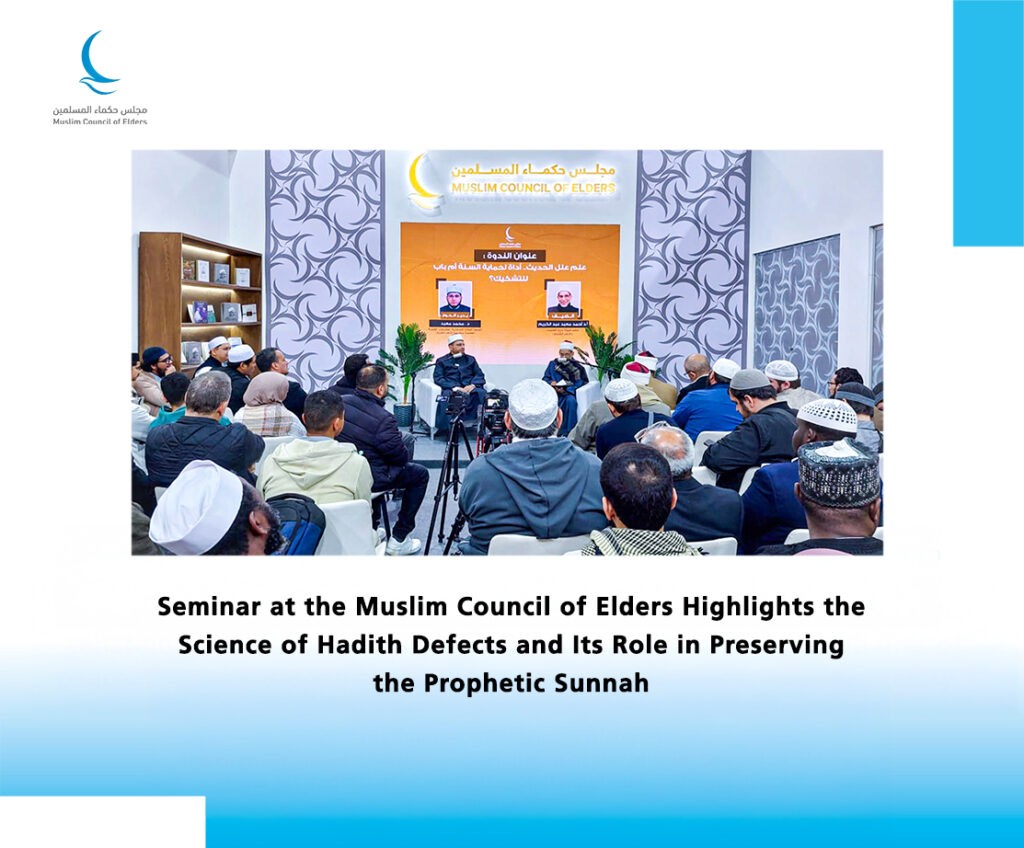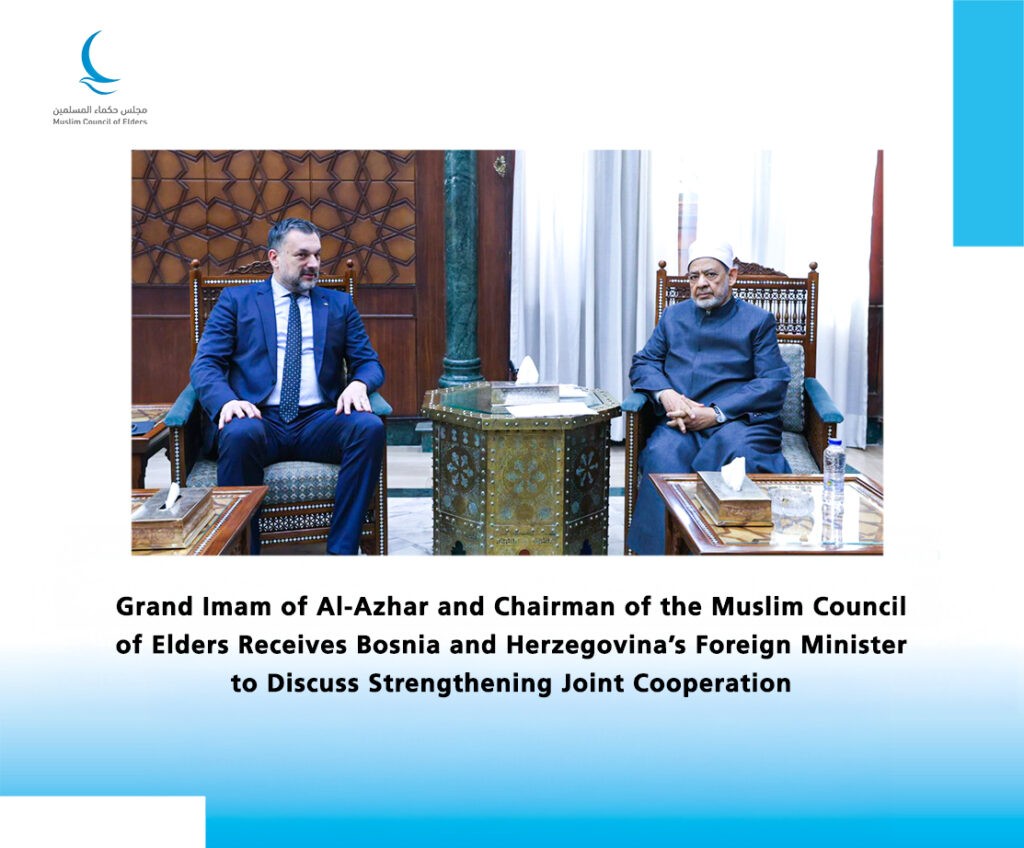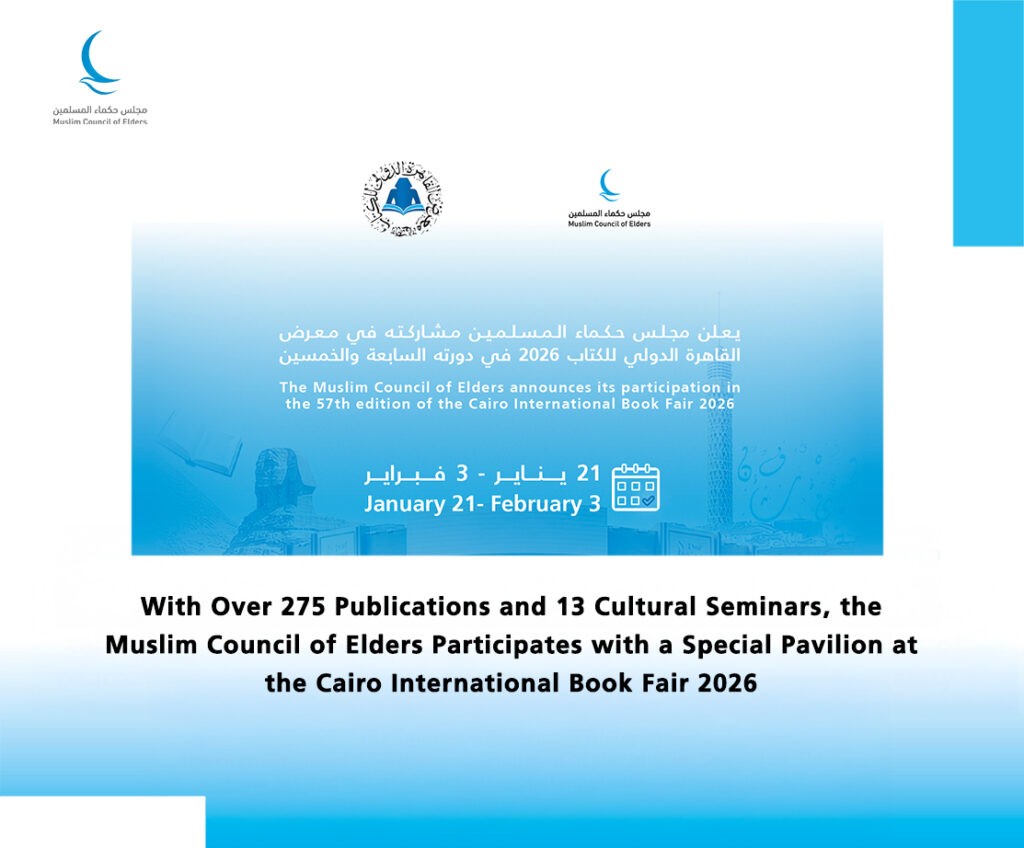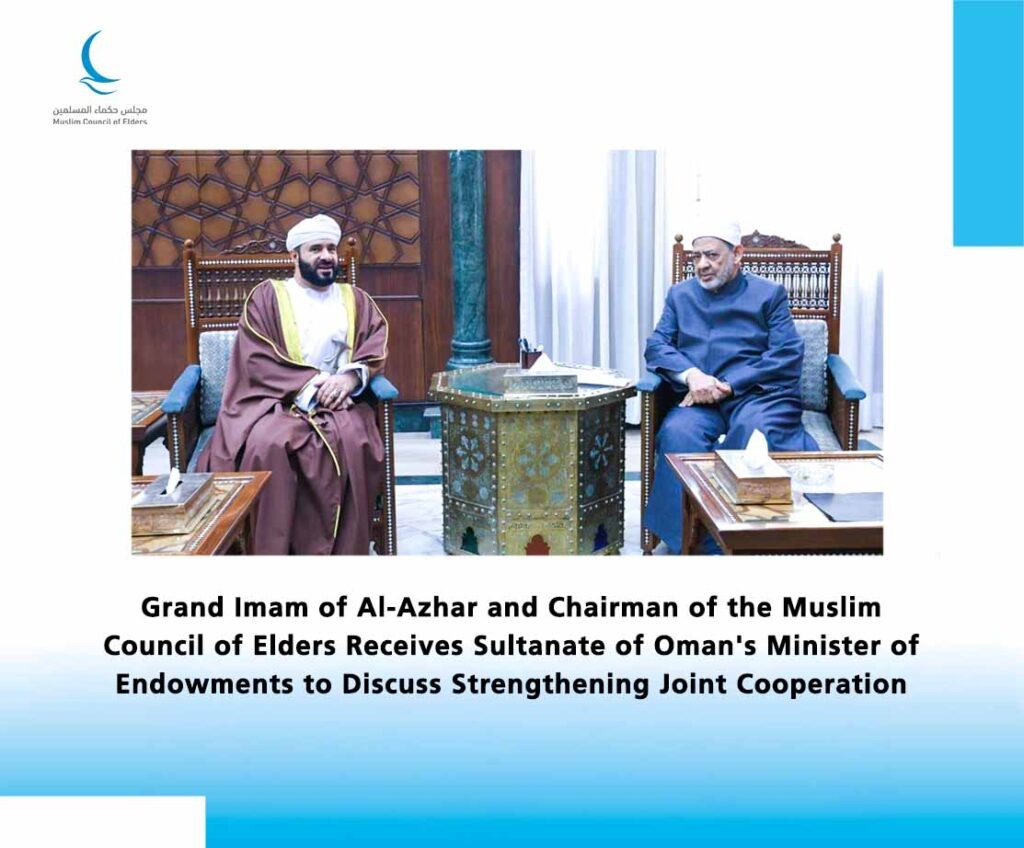Cairo International Book Fair Hosts an Intellectual Seminar Titled “In the Sanctuary of Imam Al‑Tayeb”
The pavilion of the Muslim Council of Elders at the 57th Cairo International Book Fair hosted a large‑scale seminar titled “In the Sanctuary of Imam Al‑Tayeb: A Reading of the Works Dedicated to His Eminence the Grand Imam.” The seminar was attended by the eminent scholar Sheikh Hassan Al‑Shafie, member of the Council of Senior Scholars at Al‑Azhar and Member of the Muslim Council of Elders, and Professor Dr. Mohamed Al‑Duwaini, Deputy of Al‑Azhar.
The seminar, moderated by Dr. Samir Boudinar, Director of the Al Hokama Center for Peace Research, marked the launch of the first edition of this unique documentary and humanitarian work. The book includes a collection of articles and testimonies written by senior religious leaders, thinkers, and international figures, dedicated to His Eminence Professor Dr. Ahmed Al‑Tayeb, Grand Imam of Al‑Azhar and Chairman of the Muslim Council of Elders, on the occasion of his 80th birthday.
The diversity of international testimonies featured in the book reflects the high global standing of the Grand Imam as a moral conscience for the world, a voice of wisdom in a turbulent era, and a symbol of moderation, dialogue, and human coexistence. Rather than merely celebrating an individual, the book documents the journey of a comprehensive ethical and intellectual school embodied by Imam Al‑Tayeb through decades of scholarship, wisdom, moderation, dialogue, defense of human dignity, and the promotion of human fraternity and global peace.
In remarks filled with appreciation, Sheikh Hassan Al‑Shafii affirmed that His Eminence Professor Dr. Ahmed Al‑Tayeb has presented a model to be emulated in wisdom, moral integrity, and the assumption of responsibility amid profound challenges. He noted that the Imam’s deeply rooted place in the hearts of Arabs and Muslims did not come by chance, but is the result of a sincere and devoted journey of giving.
Sheikh Al‑Shafii revealed what he described as “the secret behind Imam Al‑Tayeb’s enduring contribution,” summarizing it in key elements that shaped his exceptional character: a deep scholarly passion and genuine love for knowledge; dedication to its pursuit and dissemination; sincere loyalty to Al‑Azhar and its historic mission; constant consciousness of God and focus on the Hereafter; detachment from worldly temptations and transient positions; and a Sufi upbringing that elevates the value of knowledge while diminishing attachment to wealth and worldly gain.
At the outset of his remarks, Dr. Mohamed Al‑Duwaini described the Grand Imam as a proponent of “conscious and sound religious guidance,” emphasizing that whenever Imam Al‑Tayeb addresses jurisprudential or societal issues, he does so with keen insight that reads reality and anticipates the future, placing the concerns of the nation and the Ummah above all else—so much so that his words came to embody the principle, “Peace by which no one suffers.”
The Deputy of Al‑Azhar noted that Imam Al‑Tayeb assumed the position of Grand Imam at a time of exceptional global complexity, when Islam faced unfounded accusations. Yet he traveled across the world, east and west, with courage and steadfastness, ultimately succeeding in dispelling fears of Islamophobia to the extent that Europe itself turned to Al‑Azhar seeking its moderate methodology.
On the domestic level, Dr. Al‑Duwaini highlighted Imam Al‑Tayeb’s role in extinguishing sectarian strife, stating that the Imam courageously led the establishment of the Egyptian Family House to unite Muslims and Christians of all denominations, thereby neutralizing calls to fanaticism. He also pointed to the Imam’s call to abandon the term “minorities” in favor of “full citizenship,” which embraces all without discrimination based on religion or ethnicity.
Dr. Al‑Duwaini further shed light on the human and administrative dimensions of Imam Al‑Tayeb’s personality, explaining that he leads institutions with gentleness and mercy without weakness, and firmness in truth without harshness. He emphasized that the Imam’s office is always open to everyone, and that he consistently instructs his aides, “Do not bar people from me, and do not turn away anyone who seeks me.”
The Deputy of Al‑Azhar concluded by highlighting one of Imam Al‑Tayeb’s major international achievements: Al‑Azhar’s efforts to promote dialogue, tolerance, and peaceful coexistence—undertaken with the support of Judge Mohamed Abdelsalam—which culminated in the launch of the historic Document on Human Fraternity in Abu Dhabi in 2019, alongside the late Pope Francis, former Pope of the Catholic Church. The document has since become a cornerstone of dialogue between East and West and a foundational reference for affirming human dignity as a basis for global engagement.
The Muslim Council of Elders is participating at the 57th Cairo International Book Fair, held from 21 January to 3 February 2026. The pavilion features a wide range of publications by the Council, in addition to organizing a series of seminars, activities, and events focused on promoting the values of goodness and peaceful coexistence among all people.
The Muslim Council of Elders’ pavilion is located next to the Al‑Azhar Pavilion in Heritage Hall No. 4 at the Egypt International Exhibition and Convention Center in the Fifth Settlement.










